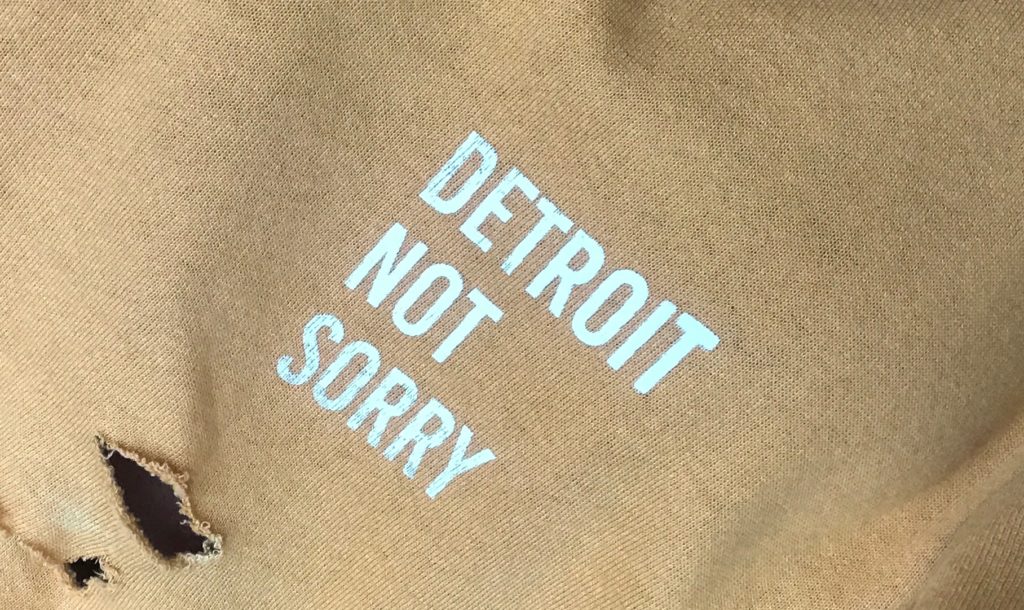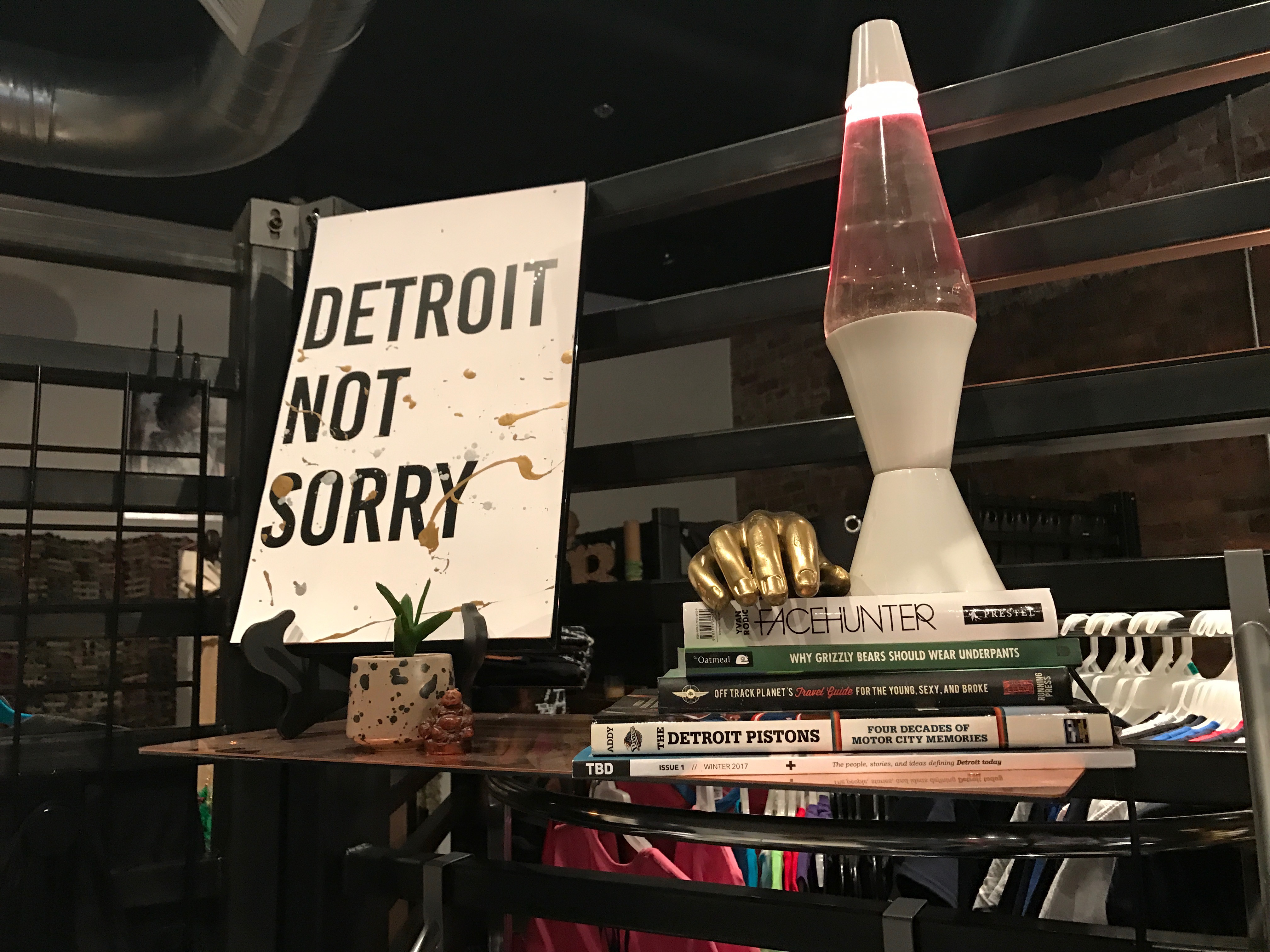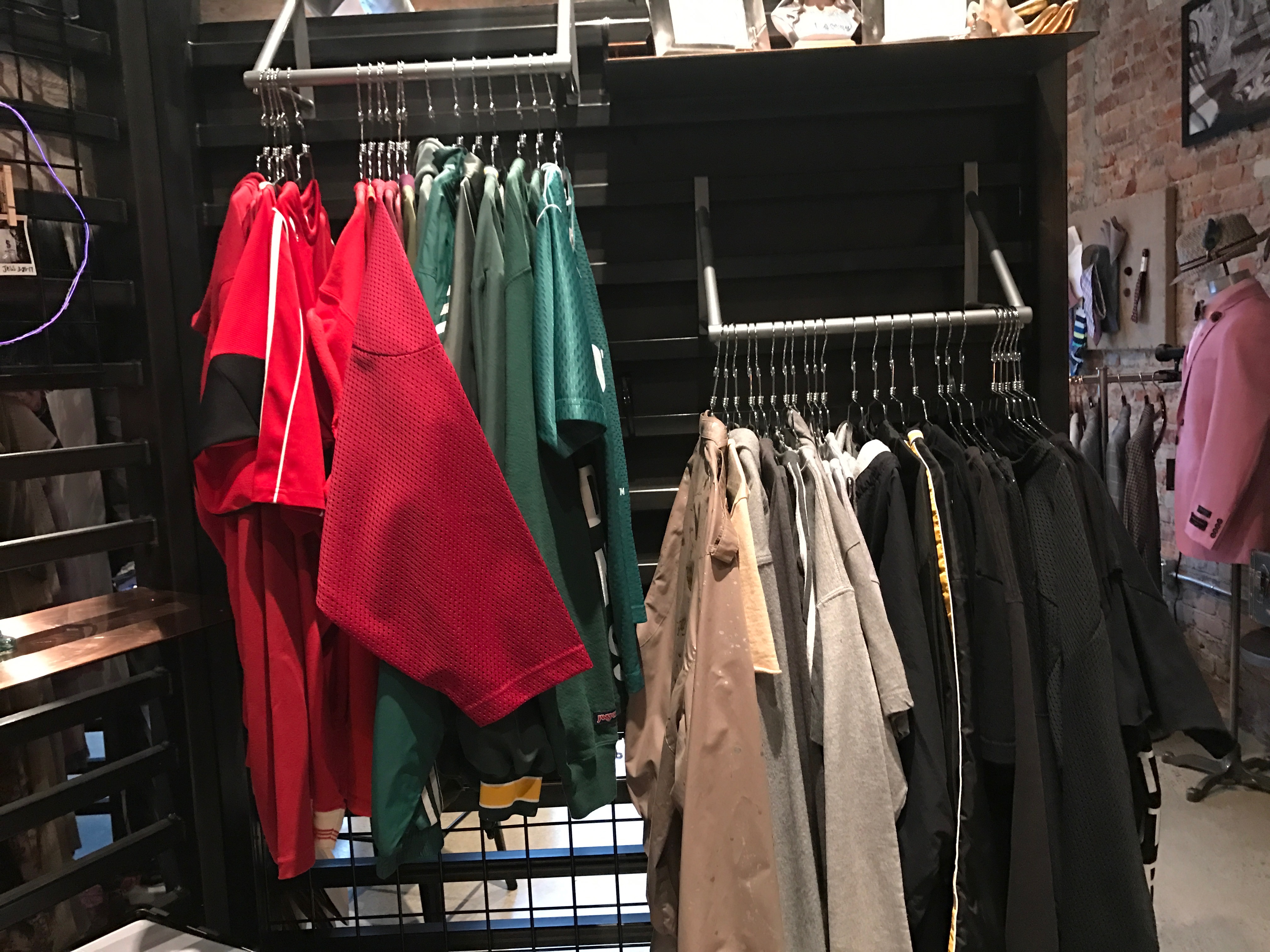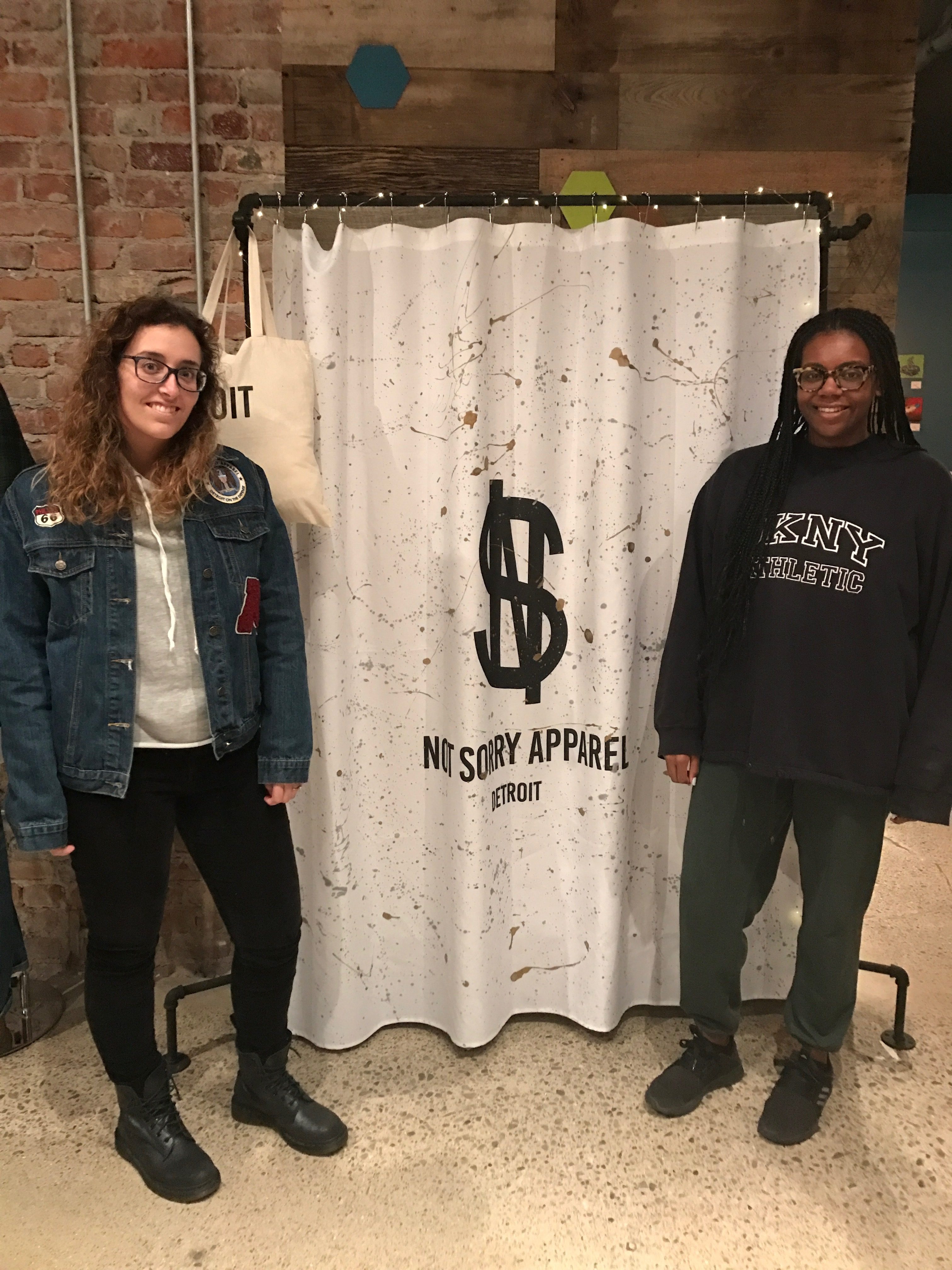An Interview with the Not Sorry Apparel Team
In April 2016, the world heard Beyoncé belt out three words: “I ain’t sorry.” Although Queen Bey was singing about being unapologetic in a romantic sense, that simple statement began to be used as a mantra for various people going through different walks of life.
Not Sorry Apparel is all about not being sorry for who you are. Founders Jessica Hruska and Dy-Min Johnson started the brand a year ago, initially offering customers handmade, screen-printed items. Fast forward to today, the company now upcycles clothing instead of making everything by hand, but the core message of staying true to yourself hasn’t changed one bit.
While the brand, which operates out of the Cass Collective, is well known for its “Detroit Not Sorry” prints, Hruska and Johnson made it clear to me that they have way more up their sleeves. The two just released their Army collection, which was inspired by today’s politics. Items of various shades of gray, green and navy were distressed and adorned with the word “Armed” in bold lettering. Not Sorry Apparel is not only a brand that makes you feel liberated but makes you think as well.
I got the chance to have a chat with both Hruska and Johnson about fashion, their vision, how their design process helps the environment, and why everyone should scream out “I ain’t sorry” at the top of their lungs.
DFN: I really love the whole message of being unapologetic and just being yourself. What prompted you to start the brand?
Jessica Hruska: We were trying to come up with a name that represented how we were feeling at the time. People, especially women, tend to say sorry a lot; it’s like an impulse. We just wanted something that represented being unapologetic. We kept playing around with that idea of not being apologetic of who you are or what you do, especially how it relates to art. And at least personally, I was trying to think of it in a way where like, I’m trying to develop this person that I am that maybe my parents don’t approve of…just things people our age are kind of going through. We wanted something that represented being unapologetic, being true to who you are despite what friends, family or society is telling you is appropriate. We were brainstorming and we were like, “Not sorry! That’s it!” We did some research and no one was using that name, and we were like, “Let’s just go for it.”
Dy-Min Johnson: I think what we were trying to do also is just say what we want to do in the name. A lot of people always ask us what it means, which is funny. But to us, we can hear it and go, “Not Sorry Apparel. OK, I understand what this is about.”
Jessica Hruska: I find that it’s more than a brand, it’s really like a lifestyle. It’s just about what you do and not being apologetic for it. It can be anything from standing by your art as an expressive form that may be controversial, or just like, little things. I’ll use it when I’m trying to psyche myself out about something. I’ll be like, “Why am I so in my head about this really insignificant thing? Not sorry.” And then I’ll just do it. I’ve kind of been using it as a mantra to get myself out of being in my head about things that I shouldn’t be.
DFN: Why do you think it’s important for people to be unapologetically themselves?
Dy-Min Johnson: Mainly – this is gonna sound a little bit morbid – but life is too short. You’re gonna die. Like, legit. I think about that more often than I should. Not in a negative way, but just like, you might as well do it; you’re gonna die! People think I sound crazy when I say that, but it’s the truth. You might as well be yourself because everyone is living in their own perspective and their own world anyway. It really doesn’t matter how you’re trying to come off to someone else because they’re going to see you in your perspective. So be unapologetically you, go through life that way. You’ll have a better time, you’ll connect with the right people, and the people that don’t mess with you? That’s fine. We’re all in our own worlds; I strongly believe that. So you should just do your thing.
Jessica Hruska: I just think there’s a lot of people trying to control others. Especially nowadays with politics and all that crap. It’s not about controlling people, it’s not about following what people tell you to do or how to feel or how to act. Don’t apologize for how you feel or what you wanna do.
Dy-Min Johnson: I think it’s important that we all embrace our differences and that collectively starts to be the thing instead of this whole “Melting Pot” crap that I don’t believe in. Differences are cool. We don’t have to go at it just because we’re different.
DFN: What I find to be really unique about your brand is that you upcycle clothing. I’ve heard the term a few times, but if you were to explain it to someone that literally knew nothing about it, how would you explain it to them?
Dy-Min Johnson: I would just say upcycling – for us, at least – we creatively reuse clothes that already exist.
DFN: How does that benefit the community?
Dy-Min Johnson: First of all, I think we’ve had a lot of development in terms of retail in Detroit, but not all of it is accessible. So that’s one thing that we kind of wanted to provide that we couldn’t provide with our handmade manufactured stuff; we’re able to lower the price point. Also, just for the environment and for the earth, I think our generation especially is pretty conscious about what’s going on and we want to be conscious and we want to live in a way that’s not going to ruin the earth for our kids and grandkids. We have a totally different mindset than the previous generation before us.
Jessica Hruska: Yeah, when we were doing research, we found out that fashion is the number two pollutant in the world. That was really profound to us because no one really talks about it. Everyone is always like, “Oh, oil! Blah, blah, blah.” But fashion is right up there with it. When we changed our offering from handmade products to upcycled, that was a big part of it. But also, Dy-Min and I love thrift shopping. We wanted it to be more than just a resale thing because we’re very DIY and we wanted to make it our own. So that’s kind of where we add our own elements to each piece and make them one-of-a-kind. Each piece is the only one we have. So it kind of further strengthens what we’re going for in our brand.
DFN: I actually watched this documentary called “The True Cost” and as you said, I had no idea that fashion was polluting the earth like that. I donate clothes all the time and I never thought, “Well, what if those clothes at the Goodwill don’t get sold?” They just get dumped off somewhere. You have these people that live in these other areas that literally don’t have clothes. And then we just go and dump them and they just sit there because they’re not biodegradable.
Dy-Min Johnson: And [we have] some awesome stuff, and if anything, I feel like higher quality things, because you’re getting things that are kind of donated from the past before fast fashion even existed. We could also argue that our clothes may even last longer than fast fashion.
Jessica Hruska: To piggyback off that, we get a lot of people who will come to us now with their clothes and be like, “OK, I don’t wear this a whole lot, but I still want it. And they’ll ask us to customize it for them and add prints to it. And then they’ll be like, “I’m wearing it all the time now.” So it’s kind of like reimagining your own clothes … Also, someone pointed out to us that the clothes have been worn before so they kind of have that homey feeling … they’re not as stiff. We curate everything. Dy-Min is our main buyer, I would say. She handpicks everything. We make sure it’s quality, we look at the tags and obviously feel the fabrics, so it’s not like, “Oh, let’s just grab a bunch of stuff.” It’s very well thought out.
DFN: When you’re searching for things to buy, do you go to specific spots to look for stuff? Do you look for a specific type of brand? What are some of the qualifications that you look for when you’re looking for items?
Dy-Min Johnson: I do have my favorite spots like donation centers, or there are stores that have my favorites. I think the community that it’s in affects a lot of the merchandise that you get inside the stores. I kind of take that into consideration. I look for what our customers ask for … I want to work on another collection in the summer where I’ll probably focus on those sorts of Tommy Bahama shirts. Other than that, I go with what I see. Usually, when I see it I go, “OK, this could be this.” I bought a bunch of oversized shirts last week, but I think they would look better as some upcycled bodysuits. A lot of times, it’s very organic and natural.
Jessica Hruska: Almost everything is from the men’s department from the stores that we go to.
Dy-Min Johnson: Yeah, pretty much everything. But we still mark it as unisex. Even the crop tops I still feel are unisex if someone wants to debate me on that. Everyone has seen The Fresh Prince of Bel-Air.
DFN: You moved into the Cass Collective space last month. How do you like it so far?
Dy-Min Johnson: So far, so good. I really love everyone that we work with, which I wasn’t expecting. Not that I expected to dislike them, but I just thought I was gonna do my thing and then leave. I really like our space, too, because it challenged us. We had no clue what we were going to do the night before we thought we were opening. Everything got delivered to my house and we didn’t know if anything was going to fit. It was like 9 p.m. and we were opening the next day. Just seeing what we did with such a small amount of space, and seeing how it looks different from everyone else’s reaffirmed that yeah, we can do this sh*t. So that’s been really nice. I feel like it’s just been more and more confirmation to keep going.
Jessica Hruska: Yeah, it’s a really creative space to be in and I feel like I’m always getting ideas when I’m here by talking to other vendors and seeing what they’re doing. They’re usually sewing or making jewelry or showing me the latest products that they made. So that’s been really cool just to bounce ideas off of everyone here.
DFN: So this may be a hard one because I feel like all creative people have a hard time answering this question, but what inspires you?
Dy-Min Johnson: That is hard!
Jessica Hruska: We’re inspired by everything. We’re always sending each other pictures of stuff.
Dy-Min Johnson: Sometimes even in the store I’m inspired. You’re seeing all these things that people have given away. I keep running past this sweatshirt and no one’s buying it, so I guess I need to buy it. That’s how often I go … I still have some celebrity influence, too. I love Rihanna. Everyone loves Beyoncé. I think right now, a lot of the 90s sort of nostalgia is very inspiring, and I’ve kind of already been dressing like that, so I’m just tailoring it more to fit that aesthetic.
Jessica Hruska: I’m definitely influenced by what’s going on in the city like local artists and what they’re doing. I go to a lot of art shows and I’m always inspired by those and get to see what people are creating.
Dy-Min Johnson: I love old sitcoms. Well, not old, but like, A Different World. I’m a little salty it’s off Netflix. I’m just inspired by people, too, and them just doing their own thing. Even if I don’t know what’s going on. I’ve got friends that are in some rock bands and I never really know what they’re saying, but I go [to their shows] and I’m just like, “Hell yeah! You’re in your element killing it and I’m so inspired. I love it.”
DFN: What’s been the most exciting or rewarding thing that’s happened since you’ve launched your brand?
Jessica Hruska: I think for me, it’s just like when people get it when they see a graphic and they smile or they laugh or they have some type of emotional reaction to it. It’s cool when people connect with you and you don’t have to say anything … That’s all I could ask for with what we’re creating.
Dy-Min Johnson: I feel like one of my highlights – which probably sounds pretty vain, but whatever – was when we were on the news; Channel 4 for WDIV for the holiday. It was just so random. It was just all so crazy to me. I was just like, “You think this is worthy to put out to however many people watch the news?” I just felt rewarded in that way. Not that I need anyone to give me a pat on the back, but that was a huge one. That was really cool to experience.
Jessica Hruska: I feel personally very rewarded to work with Dy-Min. She inspires me and I’ve noticed even my confidence and the way I think has changed since we started working together. Also, I can get really down on myself, so she kind of balances me out.
DFN: What can we expect to see from you all this spring and summer?
Dy-Min Johnson: First of all, we’re going to open up our customization. I spoke earlier about people bringing in their garments to us. We’re gonna not only offer the [screen] printing that we do but also offer embroidery. So we’ll be doing that to some things and also just letting people bring in their own things and charge a fee for that. But also, just more designs. People love the “Detroit Not Sorry,” which is a large part of why we’ve done it, but we have a Google Drive full of ideas of graphics. So we’re just kind of ready to start cranking those out one by one. We’re probably gonna put together a yearbook collection slash design slash lookbook; I don’t know what we’re going to call it yet.
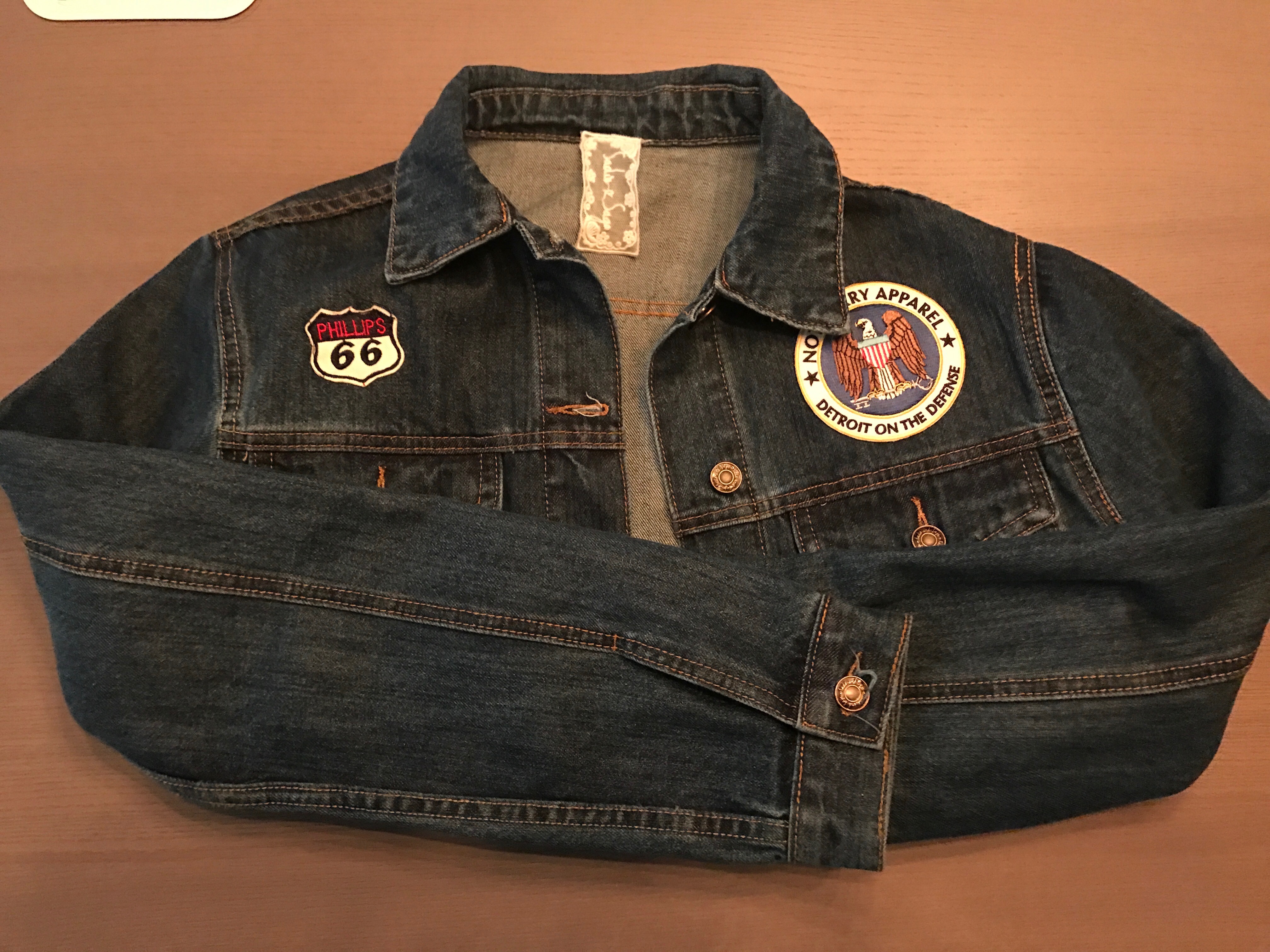
Jessica Hruska: So like, Detroit Class of 2017, 0r whatever … and just pick a few friends, movers, and shakers, people we’re inspired by to wear some of our looks. But also it’s like a little piece about Detroit and Detroit fashion … It’s cool because since we’re not in a big corporation or whatever, we could literally put out new stuff tomorrow if we wanted to. I mean, there’s probably stuff that we haven’t even thought of that we’ll be making this summer just because it’ll depend on what we see, what we’re inspired by, or what our customers tell us they want … That’s one thing we do really well, we listen to our customers. They tell us what they want and we just execute it.
DFN: Is there anything else you want to add that I didn’t ask?
Dy-Min Johnson: I don’t know how quickly we’ll be able to turn it around, but we’re looking to get a milk truck and then doing the printing inside, having stuff available before we even print it. People could pick what they want and we’ll just print it onsite through the truck … We’d have music because Jessica is also a DJ … Kind of making it more of an event, more of an experience instead of just like, “Hey, come shop.” That’s our ultimate goal.
Jessica Hruska: And it allows us mobility, so we could do a pop-up on tour and go to different cities. I like the flexibility it offers. Let’s say we want to vend an event and maybe we do specific designs for that event so it’s exclusive to that event. I think it offers a lot of different ways to expand our offering, but also plays to our DIY style. We’re all about creating an experience. People are not going to the mall as much as they used to. People are either shopping for convenience or shopping for an experience, and I feel like we definitely want to provide that experience. It’s something we want to share with people, like when we’re screen printing your shirt right in front of you. Eventually, I’d like to get an embroidery machine and be able to do that right in front of people, too. I think that’s going to inspire people when they see it, especially women. I always see a lot of freakin’ guys do it, I don’t see a lot of girls doing it, but maybe they’ll be like, “That is super cool that they’re doing that, maybe I want to try that.”
Dy-Min Johnson: I like the transparency of it, and I think people like that, too … I think people really desire that kind of transparency and we’re down to give it to them.
Written by Evann Webb

